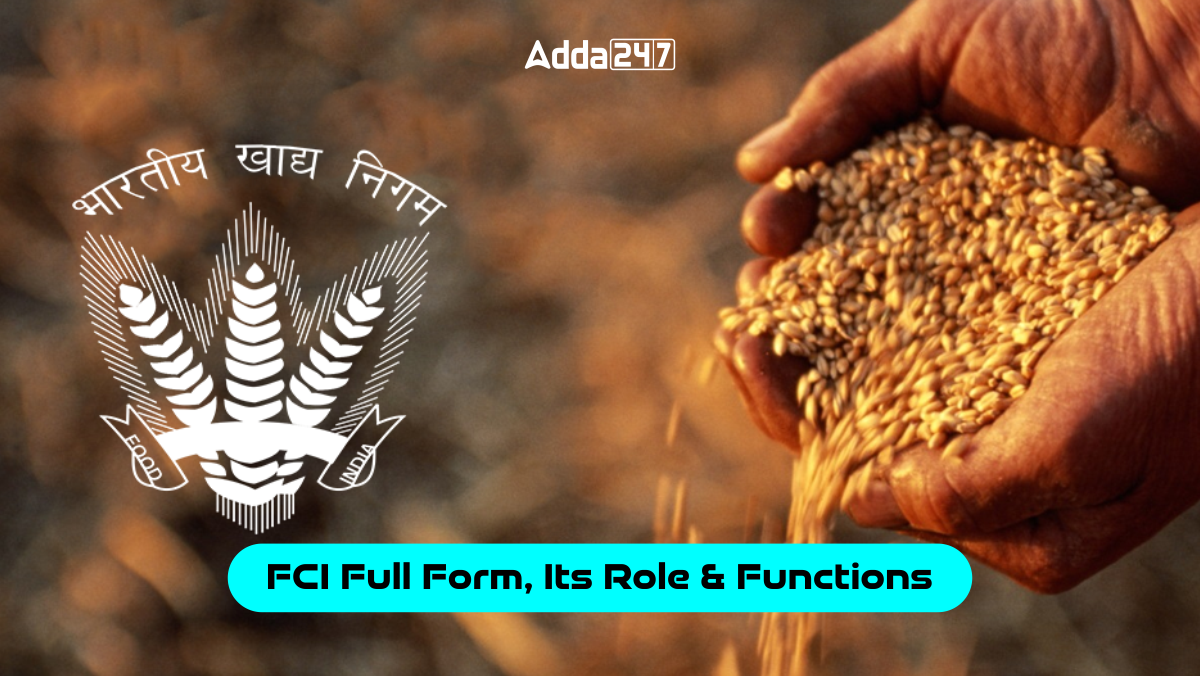FCI which stands for Food Cooperation of India is an essential organization in the agricultural and food distribution sector. Founded in 1964, FCI plays a pivotal role in ensuring food security and the efficient management of food resources in India. In this article, we will explore the full form of FCI and delve into the significance, role and functions of FCI.
FCI Full Form
The full form of FCI is Food Cooperation of India.
FCI Full Form and Its Foundation
The Food Cooperation of India, or FCI, operates as an autonomous body under the Ministry of Consumer Affairs, Food and Public Distribution. Established on 14th January 1965, with its headquarters in New Delhi, the FCI’s primary objective is to develop and manage the country’s food security infrastructure. To achieve this, the FCI focuses on three key functions: procurement, storage and distribution.
Organizational Structure of FCI
The FCI is structured into five directorates:
- Procurement
- Storage
- Transport
- Distribution
- Marketing
With over 15,000 offices and warehouses across India, the organization boasts a vast network. It is one of the largest employers in India, providing employment to over two lakh people.
Functions of FCI
The FCI has several essential functions, which include:
- Procurement, Storage and Distribution: The FCI is responsible for procuring food grains from farmers at minimum support prices and maintaining effective stock levels to ensure national food security. It then distributes these grains throughout the country through its extensive network.
- Price Stabilization: The FCI intervenes in the market to stabilize food grain prices.
- Management of Other Commodities: In addition to food grains, the FCI procures and distributes pulses, edible oils and sugar.
- Food Security Schemes: The FCI collaborates with state governments to implement food security schemes and fortification programs to ensure nutritious food is available to all.
- Implementation of Key Schemes: The FCI serves as the nodal agency for implementing crucial government schemes such as the National Food Security Act, Pradhan Mantri Fasal Bima Yojna, Pradhan Mantri Annadata Aay Sanrakshan Abhiyan and more.
Roles and responsibilities
The primary roles and responsibilities of the FCI are as follows:
- Procurement: Procure food grains at minimum support prices to support farmers.
- Stock Management: Maintain strategic food grain stocks to ensure food security.
- Distribution: Efficiently distribute food grains across the country through depots and offices.
- Price Regulation: Regulate market prices through buffer stocking operations.
Food Distribution
The FCI acts as the food supply regulator for India, procuring, storing and transporting food grains on behalf of the government. It ensures the smooth release of food grains to prevent shortages of essential commodities. The grains procured by FCI are issued at Central Issue Prices to support economically vulnerable sections of society through the Targeted Public Distribution System (TPDS).
Find More General Studies News Here




 Which District is known as the Medical C...
Which District is known as the Medical C...
 Which was the First Women's University i...
Which was the First Women's University i...
 Which Island is known as the Island of P...
Which Island is known as the Island of P...








